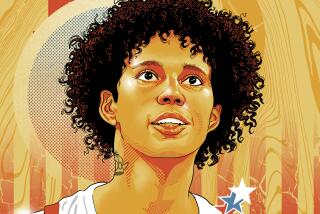SOVIET INVASION : Spring Thaw for USSR Athletes Looking West
- Share via
This spring has seen perhaps the greatest thaw for Soviet athletes seeking their fortune, fame and even a little freedom in the sports arenas of North America.
There’s a Soviet hockey player skating for the Calgary Flames in the NHL, tennis star Natalia Zvereva signed with a U.S. agent and boldly criticized her nation’s tennis federation over her prize money, progress has been made toward bringing a Soviet player to the NBA next season, and an agreement was reached for 10 Soviet boxers to fight in the United States this year.
Ten years ago, Soviet athletes, ballet stars and chess players who wanted such economic freedom had little choice but to defect. Now they’re hiring U.S. agents to market their talents -- but keeping their Soviet citizenship and the right to compete for their homeland in the Olympics.
Mikhail S. Gorbachev’s reforms have cleared the path to the West for the elite athletes, who before now have played as amateurs in name only as members of the Red Army, or on factory-sponsored teams playing in backwater rinks and courts.
As they turn pro and compete in non-communist countries, however, some of the athletes are exerting their independence and trying to fight a “feudal” Soviet sports system that keeps most of their earnings.
One who is testing the limits of individual freedom -- and “glasnost” -- is Zvereva. For the 18-year-old tennis star from Minsk, the symbol of success is a “a red Mercedes-Benz, a big one.”
At first glance, she certainly seems to be able to afford it. Ranked No. 8 in the world and No. 1 in the Soviet Union, Zvereva earned more than $500,000 since turning pro a year ago.
But she has seen little of the money because the Soviet Tennis Federation -- as it does with all its players -- has been taking her tournament checks for itself and paying her a weekly stipend of about $1,000.
On April 9, a frustrated and demoralized Zvereva went public. After losing to Steffi Graf at a tournament at Hilton Head Island, S.C., Zvereva said in a televised courtside interview that her $24,000 consolation check was “just a piece of paper,” and that she wanted the federation to give her the money she had just won.
Later that week, she announced she had signed with the Washington, D.C.-based sports management firm ProServ and would no longer turn over her checks to the federation.
That decision has put her in the middle of a dispute between ProServ and International Management Group of Cleveland, another sports agency that took over the Soviet account from ProServ in January. Both agencies now consider Zvereva their client.
Zvereva, who does not want to defect, has said if the federation refuses to giver her a percentage of her winnings, she’ll quit tennis and go back to school.
She returned to the Soviet Union with her coach and father, Marat, to discuss the dispute with Goskomsport, the Soviet Sports Committee. The Tass news agency said the ProServ contract has been put on hold, and Zvereva’s father said she would contact experts to study her new contract, with the final decision to be hashed out among Goskomsport, ProServ and IMG.
“Not a word was said about any sanctions against my probably not-very-well-considered step,” a contrite Zvereva told Tass last Wednesday. Meanwhile, she said she plans to continue international competition.
“The system of financial incentives for Soviet sportsmen of high qualification performing abroad is quite imperfect now,” admitted Yuri Portnov of Goskomsport.
After Zvereva signed with ProServ, Portnov said he believed she acted hastily in breaking away from the federation.
“Zvereva is now worth a good deal, in the literal and figurative sense of the word,” said Olga Morozova, head coach of the women’s team, adding that the most important thing was to keep Zvereva playing for the Soviet Union.
Garri Kasparov, the world chess champion from the Soviet Union, knows how Zvereva feels and strongly supports her. For years, he’s been attacking the Soviet sports establishment, which oversees chess, and he calls it “a feudal system” for the way it pays its players.
At the 1987 world chess championship in Seville, Spain, where Kasparov was supposed to receive half of a $1.85 million purse, he said he received only “$100,000 and the same again in rubles.”
“I think what is happening now in sport is very important,” Kasparov said in an interview. “It is connected to people’s fight for rights in our country, the fight to be able to make decisions for yourself.”
The Soviets are afraid more of their athletes will become independent, he said.
“Of course they don’t like it.” Kasparov said. “They are afraid it could become like a chain reaction.”
The rumblings began almost immediately. On April 23, the top Soviet male tennis player, Andrei Chesnokov, said after winning a tournament in Nice, France, that he wanted to do “the same thing as Zvereva.”
Chesnokov, 23, of Moscow, said he has won more than $500,000, but has “received maybe $10,000 to $12,000. When I won $59,500 at Orlando, I got 496 bucks from the federation. Do you believe that? $496!”
Hockey player Sergei Priakin has had a somewhat easier time in his pioneering role as the ice breaker in U.S.-Soviet sports relations.
The 25-year-old right wing for the Calgary Flames on March 31 became the first Soviet athlete to play for a professional team in North America. If the Flames continue winning in the Stanley Cup playoffs, his name soon could be etched on hockey’s holiest grail, the Stanley Cup.
He has been used sparingly because of the Flames’ talented lineup, and probably won’t be a real factor until next season. Calgary president and general manager Cliff Fletcher has said Priakin apparently was allowed to play in the West to “test the waters” before allowing other Soviets to do so, although he and others in the NHL don’t believe there will be a mass influx.
The only sour note in Priakin’s debut came when Dale Hawerchuk of the Winnipeg Jets said he “was not crazy about” a Soviet playing in the NHL. “I hope they’re not taking jobs away from North Americans.”
Star defenseman Viacheslav Fetisov, who was drafted by the New Jersey Devils, says he and two other players on the Soviets’ top unit -- center Igor Larionov and left wing Sergei Makarov -- were promised word of their possible move to the West by April 13.
“But we didn’t get any news at all and we still don’t know anything,” Fetisov said last week at the World Championships in Stockholm. “Now our team officials tell us that Moscow will inform us by telephone.”
Fetisov was recalled to the Soviet team after being dropped from the squad following an argument with head coach Viktor Tikhonov.
“I don’t know what will happen after the world championships,” he told a a Swedish newspaper before the tournament began. “It might be the salt mine as well as North America.”
The Soviet Ice Hockey Federation reportedly has agreed to a three-year, $1.5 million contract with the Devils for Fetisov, who would receive $1,200 a month.
“I’d like to play in the NHL,” said Fetisov, who turned 31 in April. “But I want to do it now because time is passing.” Devils general manager Lou Lamoriello left Stockholm on Thursday without any comment on whether an agreeement had been reached.
Makarov hopes to join Priakin on the Flames next season. Larionov reportedly has signed with a Finnish Hockey League team in Helsinki, although The Toronto Globe and Mail said Thursday he has reached an agreement to play for the Vancouver Canucks. Vancouver president Pat Quinn denied the report.
Progress has been slower to bring Soviet basketball players into the NBA, although there were encouraging signs in April.
One obstacle was cleared when FIBA, the international basketball federation, voted to allow professional players to compete the Olympics. The move would enable to Soviet players to compete in the NBA and retain their Olympic eligibility, something Soviet sports officials insist upon.
Point guard Sharunas Marchulenis, a member of the Lithuanian club Statiba Vilnius and the Soviets’ gold medal team in the Seoul Olympics, is negotiating with the Golden State Warriors and could be playing for them next season.
Marchulenis told the Soviet newspaper Izvestia that Don Nelson, the coach and general manager of the Warriors, had made him an offer. A spokeswoman for the Warriors would only say: “We are working on the situation and we have no comment.”
Marchulenis told Izvestia the Lithuanian Council of Ministers approved of his desire to play in the United States, and that commercial arrangements for his contract would be worked out by his club and the state-run Lithuanian export firm Litimpex.
Talks have resumed with Marchulenis’ teammate, 7-3 1/4 center Arvidas Sabonis, and the Portland Trail Blazers, said Portland president Harry Glickman, although he added that there was “nothing new” to report.
“We were told last year that Sabonis is the greatest hero in Lithuania, and they are very reluctant to lose their best player,” Glickman said. He added that he didn’t believe there would be more progress until after the European championships in June.
An agreement was signed in April to bring six Soviet boxers, a force in Olympic and amateur competition, to the United States for training and professional bouts.
Lou Falcigno, a New York promoter, said the boxers would be selected by October, and two of its likely members will be Alexander Miroshinchenko and Rahat Umerbekov. Among the trainers being mentioned for the Soviet fighters have been Tommy Gallagher, Angelo Dundee, Richie Giachetti and Kevin Rooney. Neither the Soviets, who say they have 277,000 boxers in their country, nor Falcigno would discuss the financial arrangements.
More to Read
Go beyond the scoreboard
Get the latest on L.A.'s teams in the daily Sports Report newsletter.
You may occasionally receive promotional content from the Los Angeles Times.






